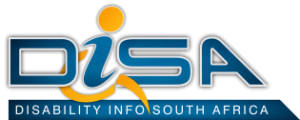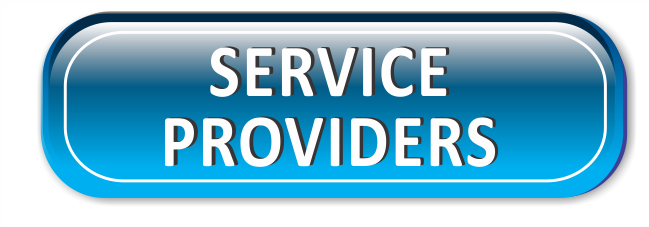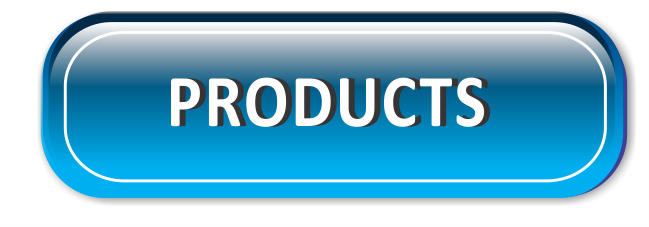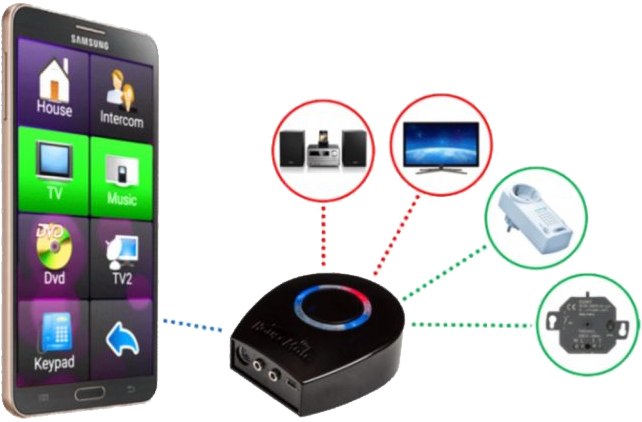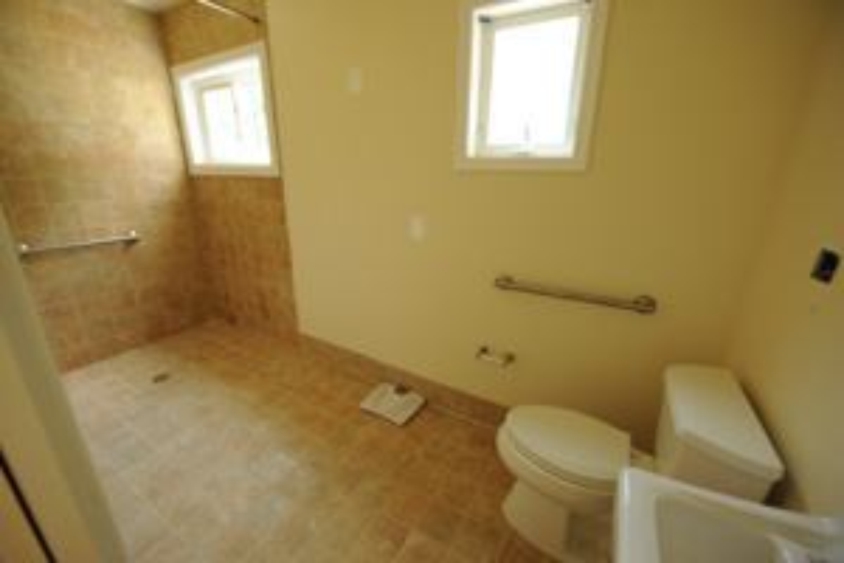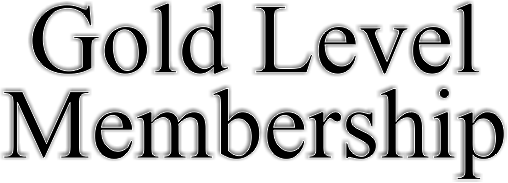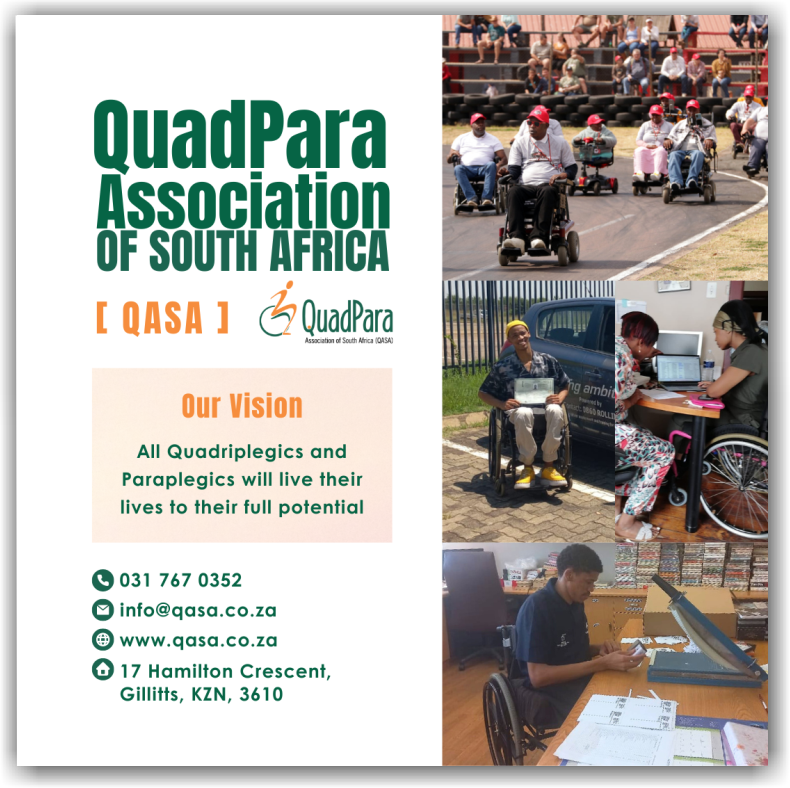Accessible Housing
Introduction
"Accessible Housing" refers to the construction or modification of your home, through renovation or home modification of housing, to enable independent living for persons with disabilities. Accessibility is achieved through Universal Accessible Design, but also by integrating accessibility features such as modified furniture, assistive devices, shelves, cupboards, electronic devices and Home Automation Products.
Access is typically defined within the limits of what a person sitting in a wheelchair is able to reach with arm movement only, with minimal shifting of the legs and torso. Most houses in South Africa are not originally designed to accommodate wheelchair users or older persons. Homeowners may therefore be challenged by the need to find designers and renovators familiar with accessible design issues.
Companies and Organisations That Can Assist
There are various, organizations and companies such as QASA that focuses on improving access for persons with Mobility Impairments through providing Universal Access solutions, or funding for Ramps and other adaptions, or Access Solutions in higher education environments, workplaces and private housing.
QASA
Wheelchair Accessible Homes: The QuadPara Association of South Africa (QASA) is a non-profit organisation (NPO 000-881) of Quadriplegics and Paraplegics in South Africa. QASA’s mission is “to improve lives by securing resources to advocate, educate, capacitate, support and mobilize”. QASA’s vision is that “all quadriplegics and paraplegics will live their lives to their full potential”. QASA develops products, programmes and services for quadriplegic and paraplegic members to build their capacity and ensure opportunities for societal integration and empowerment.
These projects include but are not limited to the Wheelchair Accessible Homes:
Persons with mobility impairments have a wide range of housing needs, especially accessibility features to facilitate independent living. Inadequate access not only limits independence, but also entrenches the disability. The focus of QASA’s Rural Development Project is to identify the accessibility needs of persons with mobility impairments and remove accessibility barriers. Ramps and accessible bathrooms/toilets increase independence, uplifts morale and improves quality of life for persons with mobility impairments in peri-urban and rural communities.
Click on the link above to find out more about "Wheelchair Accessible Homes", or visit our Organizations - QASA Page to find out more about QASA and the other Projects and Services that they provide, or their website at www.qasa.co.za.
Public Buildings
The Government have put laws in place to insure that new public buildings are designed and build with certain features to make them accessible to persons with disabilities. The National Building Regulations and Building Standards Act deals with facilities for persons with disabilities, and includes access to public areas. City streets, public buildings and restrooms are some of the more visible changes but also included, are the installation of elevators, automatic doors, wide doors and corridors, transit lifts, wheelchair ramps, curb cuts, and the elimination of unnecessary steps where ramps and elevators are not available, thus allowing persons who use wheelchairs and other Assistive Devices to be able to use public sidewalks and public transit more easily and safely.
These features that have been introduced by the Government, are referred to as "Accessible Features" and are dealt with in detail on our "Accessible Features" Page, however many public areas and buildings are still not compliant to regulations, while some new buildings walkways and parks are still being designed and built without consultation from a Universal Access Consultant and are therefore often not compliant. This ultimately leads to disappointment when these facilities are not accessible and further costs to alter these venues to become accessible to all persons with disabilities.
If you are going to be altering or building a new place of residence or business, please do the right thing and contact a Universal Access Consultant such as QASA to make sure that your new residence or business is compliant, or please Contact Us if you know of any new public buildings or venues are not accessible.
Making Your House Accessible
Disability can effect anyone at any time, and many people struggle later in life due to old age, which often leads to the need in creating an accessible hazard free home. Many senior citizens try to retain their independence by staying at home for as long as possible by adding ramps, handrails, grab bars, etc. throughout their home to improve accessibility and reduce the risk of falling.
In your own home you're not necessarily limited to the government standards set aside for public buildings, but these regulations are put in place for your own safety and before making these types of adaptions to your home, you should acquire the services of Universal Access Consultants and builders who specialize in accessibility, to make sure that any adaptions done will assist you as much as possible. You may also require plans or permits for the adaptions that you want to make.
There are a variety of areas where adaptations and assistive devices can improve accessibility for persons with mobility impairments, especially for those in wheelchairs, they include:
- Ramps
- Gates, Doors & Doorways
- Light switches & other controls
- Multi-Story Homes
- Accessible Bedrooms
- Accessible Bathrooms
Ramps
Depending on the design of your home, your type of wheelchair, and your physical abilities, ramps can take on different sizes and shapes. Various size ramps can be purpose built out of wood, cement or metal, while a variety small 1 or 2 step Pre Manufactured Ramps made out of rubber or metal are available to purchase from various companies in South Africa, these include small thresh hold Ramps to get you over that half a step, as well as slightly longer Ramps to get you over a full step. Visit our "Hoists, Lifts, Ramps & Transferring Aids - Pre Manufactured Small Ramps section" to find out more about these types of ramps and the companies that sell them.
Longer metal ramps are also available and can be bought from a number of companies in South Africa. These ramps can be permanent or temporary and can be removed at a later stage, if the ramps are no longer necessary. Visit our "Hoists, Lifts, Ramps & Transferring Aids - Pre Manufactured Long Ramps section" to find out more about these types of ramps and the companies that sell them.
If you choose to build a ramp, the government standard for ramps is 1:12, in your own home you are not necessarily limited to the government standard. A steeper or less steep ramp may be preferred when evaluating space limitations or other considerations, you may require a longer gradual ramp, if you use a manual wheelchair, or a slightly steeper ramp if you are restricted with space, however the government standards are put in place for your safety, so you should get the advice of a Universal Access Consultant such as QASA to make sure that any adaptions that you make, do not put yourself or others in danger. You would also need to ensure that your ramps are slip resistant and are not dangerous to other people who have to walk up them, installing handrails can assist with this. To view other safety tips and the government regulations for ramps, stairs & Hand Rails, click the "Ramps" button on the top-left of the page or click on the link below to find out more.
If you need advice or are unsure about what design would best suite you, we recommended you consult a Universal Access Consultant who can help you design a ramp that is safe and meets your particular needs. To view information about ramps that are available to purchase in South Africa, please visit our "Hoists, Lifts, Ramps & Transferring Aids - Ramps" Page
Gates, Doors & Doorways
Gates: Due to the high crime rate, many people choose to have automatic security gates installed, which are not only handy to keep you safe, but can also provide you with easy access to your property and house. You can attach a control for your front gate to your wheelchair, so that you can come and go as you please. These controls can also be fitted to the security gate or on your front door. Please Contact Us if you require any further information.
Doorways & Hallways: Most wheelchairs are generally built narrower than the width of a doorway, so under most circumstances you should not have a problem getting through doorways with a wheelchair, unless you are required to turn around sharp corners, however some security gates on front doors, make the doorway narrower so this can make it very difficult for some wheelchair users to exit or enter these doorways. You may need to adapt these gates to give you more space, or you can even use special off-set hinges to allow the door to open further.
As mentioned above, going around sharp corners can also prove difficult if you use a wheelchair, some off-road Motorized wheelchairs can make this even more difficult, so you should take this into consideration when you're choosing what type of wheelchair to buy or where you are going to live if you use a wheelchair. You may however have to do some remodeling, if you want to be able to drive directly into a room, contact a Universal Access Consultant such as QASA to make sure that any adaptions you have done, will give you the most benefits, or Contact Us if you require any information about the different types of wheelchairs that are available in South Africa.
Unlocking & Opening Doors: When it comes to unlocking and opening doors, there are a variety of options to choose from, depending on the degree of your disability and the amount of money you have available to spend. Various solutions include:
- Lowering the door handle: Door handles can be lowered or changed, so that they are easier reach and open. Straps can also be fitted to the door handle that can assist with this.
- Installing number-code locks with key pads on your doors: They are easier to negotiate than keys and can allow you to provide access to the house to people if you can't get to the door. You can tell them the code over the phone.
- Automatic door openers: There are a wide variety of different types of door openers available. This is dealt with in detail on our "Home Automation Page" on the "Door Openers" section.
Light Switches & Other Controls
Light switches and other controls, like those used to control alarm system, music, heating, air conditioning, etc. can all be moved so that they can be reached and should not be below or above the reach of a persons who use a wheelchair.
Home Automation is another solution that allows older adults & persons with disabilities to control there environment. Homes that are automated are called Smart Homes, they offer the elderly and persons with disabilities a wide variety of benefits including:
- Independence: By supplying the elderly or persons with disabilities control over their environment, they are able to gain independence and therefore re-gain their confidence and determination.
- Safety: Smart Homes can also provide both older adults and persons with disabilities many different types of emergency assistance systems, security features, fall prevention, automated timers, & alerts. These systems allow for the individual to feel secure in their homes knowing that help is only minutes away. Smart home systems will make it possible for family members to monitor their loved ones from anywhere with an internet connection.
Thanks to these benefits and others the elderly are able to stay in their homes where they feel comfortable, instead of moving to a costly health care facility. If you decide to opt for Home Automation, you may want to consider a generator as a backup in case the power goes out, which is a real concern here in South Africa during these times. There are a variety of companies that specialize in the supply and installation of Home Automation products in South Africa. To find out more about the different types of Home Automation products and most common elements, please click the Home Automation button on the top left or on the link below.
Multi-Story Homes
Unfortunately some persons who are staying in a home or apartment that has 2 or more floors (Multi-story home) may get a disability, or develop a Mobility Impairment as they get older. If this is the case, it often becomes difficult or impossible for them to maneuver from one floor to the next. Sometimes moving homes is not an option and the only alternative is the installation of some type of lift. There are 3 options to consider, they include:
There are various companies in South Africa that supply, install and service these types of equipment, you should get expert advice on what type of elevator or lift would best suit the building that you live in, as well as the type of disability that you have. Please click the "Hoists, Lifts & Transfer Aids" button on the top left or on the link below, to find out more about these types of products that are available in South Africa and the companies that sell them.
Accessible Bedrooms
Creating an accessible bedroom is very important in retaining your independence, especially for those who use wheelchairs to move about. Many persons with mobility Impairments do not have the luxury of a lot of space, but putting a bit of thought into how you set-up and lay out your bedroom, along with using a variety of assistive devices, can improve your accessibility and help you become a lot more independent.
TV & Music: Most people including myself enjoy listening to music and watching movies and TV. A large screen Smart TV in the bedroom, that I can operate whether I am up in my wheelchair or lying in bed is a "must" for many persons with disabilities including myself. You should also consider setting up your TV, so that you can see and operate it, no matter which side you face when lying in bed. If you have a shortage of space, you may want to mount your TV on a wall. There are a wide variety of assistive devices, which we call "TV & Music Aids", that can assist you to operate this equipment, so that we enjoy these hobbies without to much extra assistance. Please click on the link below, to find out more about these types of products which are available in South Africa and the companies that sell them.
Books & Reading: If you enjoy books and reading but have a Mobility Impairment, you may find it difficult to hold a book or turn pages. There are however a variety of Reading Aids which are available for persons with mobility impairments and elderly that can assist them to enjoy a book whether they are sitting up or lying in bed. Please click on the link below, to find out more about these types of products which are available in South Africa and the companies that sell them. Please click on the link below, to find out more about these types of products which are available in South Africa and the companies that sell them.
Beds: Persons with Mobility Impairments often require various Pressure Care products to assist them to reduce the chance of developing pressure sores. One of these products that are very important, are Adjustable or Home Care Beds. These are especially useful for persons who you use a wheelchair and need assistance turning, you should also consider the size of the bed you require and how much room is needed around your bed so that you can get in and out of your wheelchair and onto the bed. Adjustable Beds are available in a variety of different models, types & sizes, Adjustable Double Beds are generally more expensive, but offer a lot of benefits, including pressure relief, turning with a Draw Sheet and allowing you to easily be able to work or eat a meal if laid up in bed. Please click on the link below, to find out more about these types of products which are available in South Africa and the companies that sell them. Please click on the link below, to find out more about these types of products which are available in South Africa and the companies that sell them.
Transferring: Transferring from the bed to the wheelchair or visa-versa, may require a hoist. There are many different types and styles. Some Hoists are installed on the wall or ceiling, while others have wheels, which are used to roll the Hoist around the room. Depending on the type of Hoist you decide on, you may need more room, or some clearance under your bed. The type of transfer method you employ will dictate how much space you require around your bed, and where the bed is positioned. Find out more about the types of Hoists that are available. Please click on the link below, to find out more about these types of products which are available in South Africa and the companies that sell them.
Work Space: Whether you work from home or go out to work, you should make sure that you have an accessible work space, with not only the right type of computer equipment to meet your needs, but also have some form of desk that is adjustable for you to work at th right height. Whether you use a laptop or desktop, you'll want a good, comfortable working area that is made at the perfect height, so that you can sit under the desk and move side-to-side. It should be raised at the right height to give you easy access to our telephone, keyboard, reading materials and remote controls. If you use a mouth stick, typing stick or voice operated software, you will want easy access to your assistive devices like headphones, mouth stick holder etc.
Please click on the link below, to find out more about these types of products which are available in South Africa and the companies that sell them, which also includes various types of desks.
Accessible Bathrooms
Persons with Mobility Impairments, especially those who use wheelchairs generally require an Accessible Bathroom to be as independent as possible. An Accessible Bathroom is a special bathroom designed to accommodate persons with physical disabilities. An accessible en suite bathroom is very handy, as it not only gives you more privacy, but it also gives you quick access to a bathroom where you can lay out your accessories as you want them, the bathroom is attached to your bedroom which means that guests are less likely to use it. These Accessible Bathrooms can be designed to meet your specific needs and do not need to follow The National Standard for Building Regulations which Accessible Bathrooms in public buildings are required to follow, these are sometimes known as Disabled Toilets or Wheelchair Toilets.
These Accessible Public Toilets or Bathrooms can present accessibility challenges for some people who use Scooters or Wheelchairs, as these Assistive Devices are available in various sizes and need to be able to fit next to the toilet, so that transferring between the wheelchair and the toilet seat is possible. Accessible Toilets are designed to address these issues by providing more space and Grab Rails for users to be able to grab onto and hold during transfers.
The National Standard for Building Regulations makes laws that insure that new buildings are designed & built with a certain amount of Disabled Toilets in them and that these toilets are accessible for persons with various disabilities and need to meet certain regulations to be accessible to all persons with disabilities. If you are going to be altering or building a new complex, shopping centre, public building or business, you are required to contact a Universal Access Consultant such as QASA to make sure that your plans are compliant, please Contact Us if you need any assistance, or click on the link below to find out more about the National Standard for Building Regulations and other companies and organisations that can assist you.
As mentioned above, Accessible Bathrooms in the home do not need to meet these same regulations, as public Accessible Toilets and Bathrooms, in that Public Bathrooms do not normally include a bath or shower and need to meet the needs of a wide variety different people. "Everybody is different", some people are happy to "Bed Bath", while others prefer to bath or shower. The type of Mobility Impairment you have, and your preference in your "bathroom routines", will determine what type of "Bathroom Aids" you will need, which will therefore determine what type bathroom adaption's need to be done. There are several alternatives, whether you prefer to bath or shower, please click on the link below, to find out more about these types of products which are available in South Africa and the companies that sell them.
Bath: Some people with mobility impairments still prefer to bath. Many bathrooms come with baths already installed and therefore require less alterations. You may require Hand Rails to assist you to get in or out of the bath, but if you have a severe mobility Impairment, you may require a Bath Lift to get in and out the bath. There are a variety of different types of Bath Lifts available, you will need to choose one that is suited to you. some of these lifts are easy to install, while other Bath Lifts may require slight alterations to your bathroom to be able to install these lifts.
Shower: If you prefer to shower and you use a wheelchair, you may need to transfer onto a shower seat, or use a commode to be able to shower. Either way, you will probably need to do alterations to make the shower open plan and wheelchair friendly. If you do require an open plan bathroom, we recommended you consult a reputable builder and architect or universal access consultant who can help you design and build a bathroom that is safe and meets your particular needs.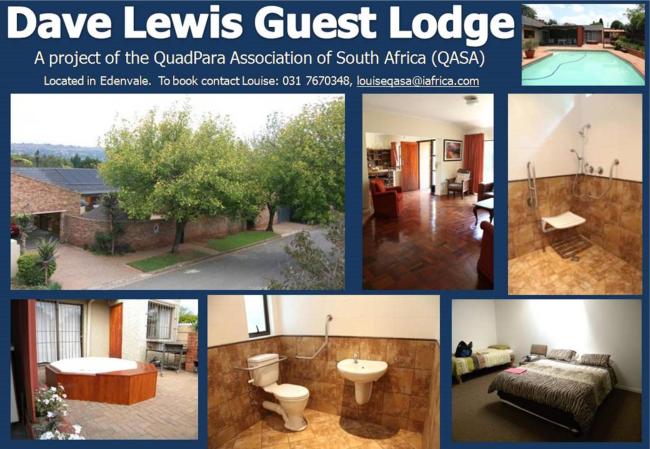
Remember to make sure that the builder uses non-slip tiles on the floor and slope this floor correctly, so that the water drains away properly. To find more about the bathroom aids listed above, as well as number of other accessories that can assist you to make your bathroom more accessible.
If you need advice or are unsure about what design would best suite you, we recommended you consult a Universal Access Consultants like QASA, who can help you adapt your home to suite your particular needs.
Dave Lewis Guest Lodge
Finding Accessible Housing while traveling in and around South Africa can be difficult, but thanks to organizations such as QASA, and projects like "The Dave Lewis Guest Lodge", this dose not need to be a problem. The David Lewis Lodge is a guest Lodge facility owned by QASA. It is situated in Edenvale, Johannesburg and provides accessible accommodation for wheelchair users and also has support of equipment like hoists, commodes and specialised bedding. A semi pool, Jacuzzi and boma facility complement the Lodge. If you would like to make a booking or have any enquiries please contact Louise on: 031 767 0348 or louiseqasa@iafrica.com
